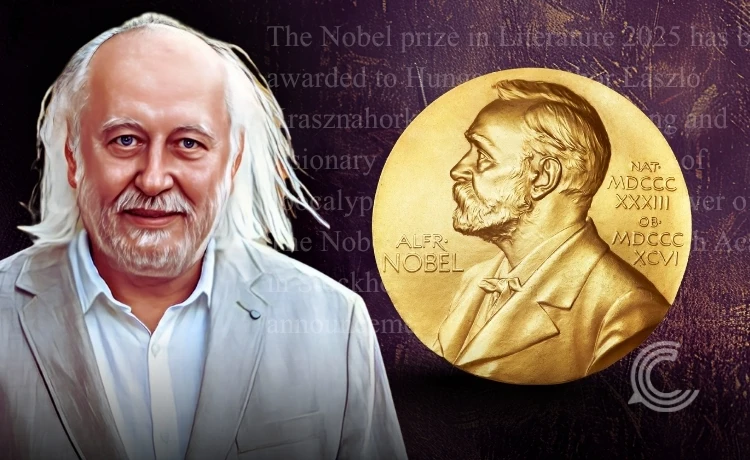Hungarian Author Krasznahorkai Wins 2025 Nobel Prize in Literature

Key Highlights–
- Hungarian author László Krasznahorkai wins the 2025 Nobel Prize in Literature.
- Recognized for his “visionary narrative that captures the collapse and persistence of human civilization.”
- The reclusive writer, known for long, winding prose, joins the ranks of literary greats like Olga Tokarczuk and Orhan Pamuk.
Hungarian novelist László Krasznahorkai has been awarded the 2025 Nobel Prize in Literature, as announced by the Swedish Academy in Stockholm. The Academy praised him for his “visionary narrative that captures the collapse and persistence of human civilization, weaving despair and transcendence into a singular artistic form.”
A Visionary Hungarian Voice Honored
Best known for novels like “Satantango” and “The Melancholy of Resistance”, Krasznahorkai’s work explores chaos, spirituality, and the fragility of human existence. His sprawling sentences, which often run for pages, create a hypnotic rhythm that reflects the endless inner monologue of humankind.
BREAKING NEWS
— The Nobel Prize (@NobelPrize) October 9, 2025
The 2025 #NobelPrize in Literature is awarded to the Hungarian author László Krasznahorkai “for his compelling and visionary oeuvre that, in the midst of apocalyptic terror, reaffirms the power of art.” pic.twitter.com/vVaW1zkWPS
A Legacy of Complexity and Intensity
Born in 1954 in Gyula, Hungary, Krasznahorkai emerged during the late Cold War era, when Eastern European writers often grappled with absurdity and oppression. His early works, such as “Satantango” (1985), have been able to capture the bleak landscape of post-communist Hungary, rightfully earning him the reputation of a modern Kafka.
Furthermore, critics describe him as “the contemporary master of apocalypse.” His narratives resist easy interpretation; each sentence is a world unto itself, built on tension, repetition, and the idea of waiting. As reported by Reuters, the Nobel committee highlighted how his writing “illuminates the thin thread connecting human resilience and ruin.”
Influence Beyond Borders
Though rooted in Hungarian history and culture, Krasznahorkai’s influence has extended globally. His collaborations with renowned filmmaker Béla Tarr, especially the seven-hour adaptation of “Satantango”, have turned his novels into cinematic landmarks.
Also Read | Nobel Chemistry Prize 2025 Awarded for Groundbreaking Metal-Organic Frameworks
According to The Guardian, his “slow-burn style” mirrors Tarr’s visual storytelling, both obsessed with decay and endurance. Western readers were introduced to his works through translations by Ottilie Mulzet and George Szirtes, who described translating him as “climbing an Everest of syntax.”
In his acceptance statement shared through BBC News, Krasznahorkai expressed gratitude “for the recognition of literature that dares to look into the abyss.” He added, “The world may fall apart, but language holds it together.”
The Nobel Prize in Literature: A Continuing Conversation
The Nobel Prize in Literature has often courted debate about topics such as representation, politics, and the very definition of “literary excellence.” Similarly, last year’s award to Chinese author Can Xue sparked discussions about experimental writing and global readership.
By choosing Krasznahorkai this year, the Swedish Academy seems to reaffirm its commitment to bold, uncompromising voices. As The New York Times observed, the decision has reflected a return to “literature that challenges, rather than comforts.”
Additionally, his win also sheds light on Central European literature, a region whose writers, from Kundera to Tokarczuk, have shaped the global literary landscape despite the political turbulence and linguistic isolation they face.
About the Author’s Distinct Style
Krasznahorkai’s prose is famously labyrinthine, paragraphs stretch over pages, commas replace full stops, and thought becomes architecture. Yet beneath the density lies emotion: despair, humor, and an aching belief in redemption.
Furthermore, as literary critic James Wood had once written in The New Yorker, “Krasznahorkai’s sentences are not meant to be read; instead, they are meant to be surrendered to.” That surrender now earns him the highest literary honor in the world.
A Nobel That Echoes Eternity
The 2025 Nobel Prize in Literature celebrates not just a writer, but a worldview, one that sees meaning in madness and art in endurance. László Krasznahorkai stands today as a reminder that even in an age of distraction, depth still matters.
Earlier this week, the 2025 Nobel Prize in Medicine went to Mary E. Brunkow, Fred Ramsdell, and Shimon Sakaguchi for their work on immune system regulation. The Peace Prize is next in line to be announced on October 10, according to the Nobel Committee.



